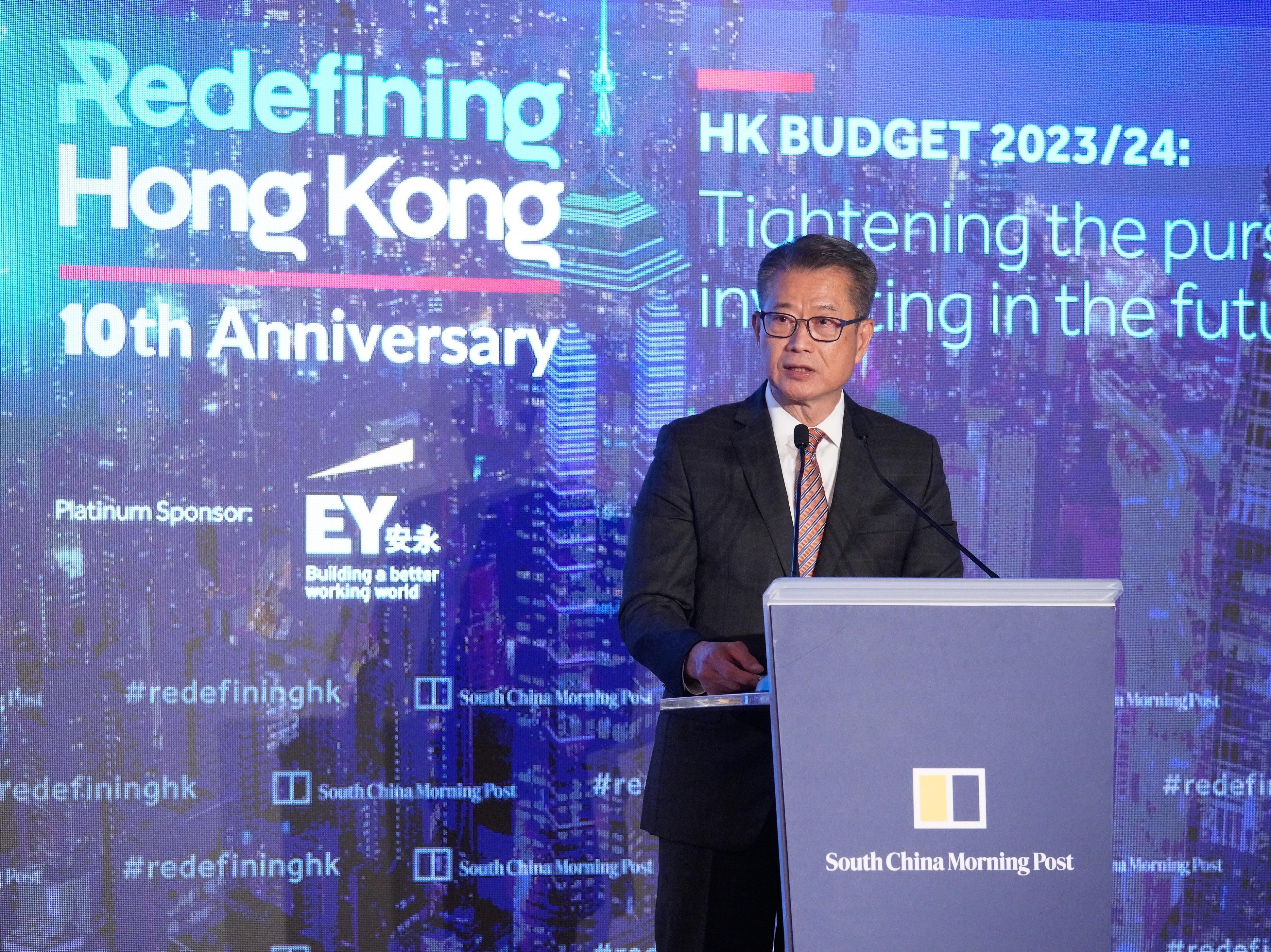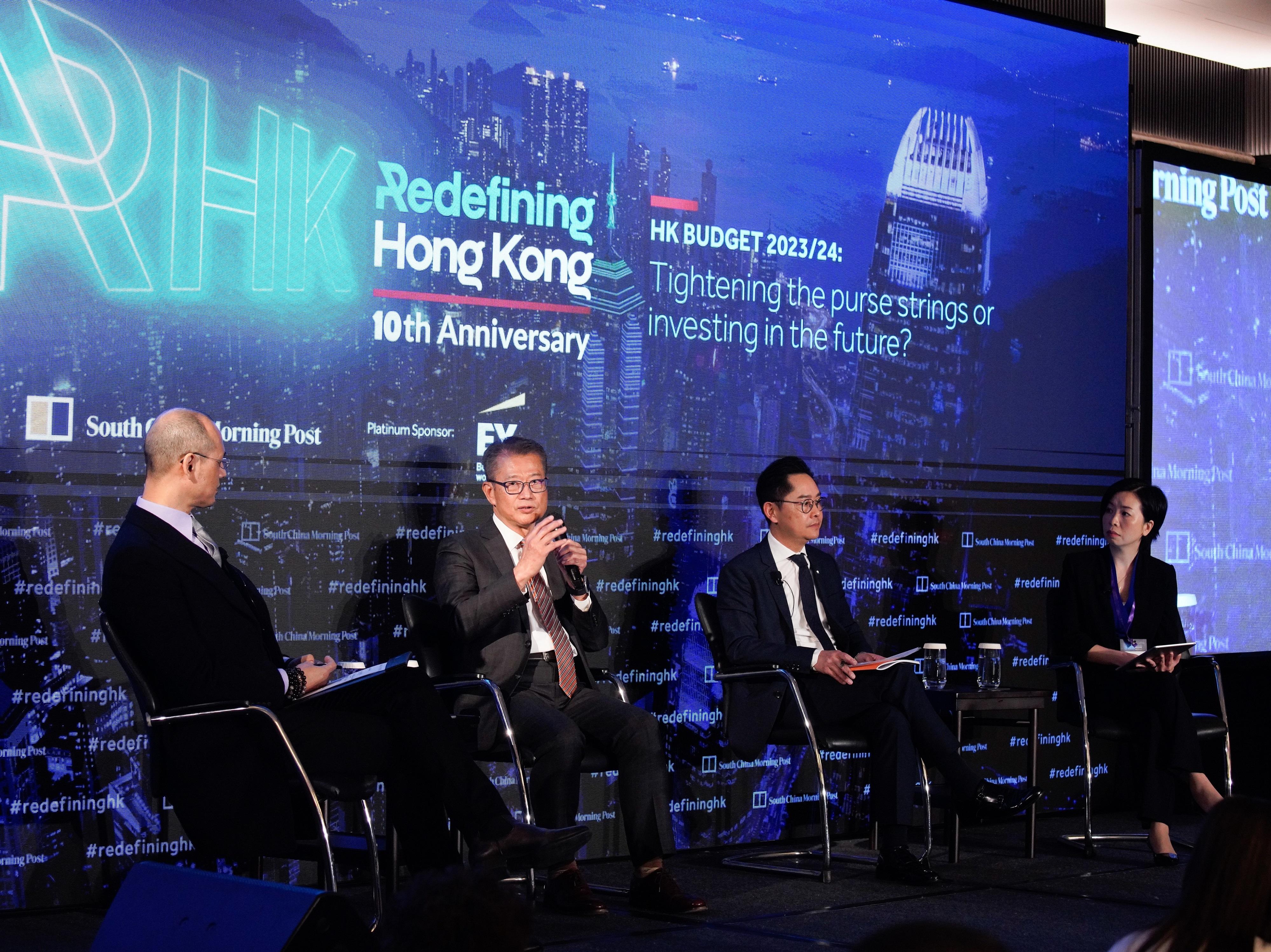Speech by FS at SCMP's Redefining Hong Kong Series seminar (English only) (with photos)
***************************************************************************************
Catherine (Chief Executive Officer of SCMP, Ms Catherine So), Tammy (Editor-in-Chief of SCMP, Ms Tammy Tam), Jasmine (Managing Partner of EY Hong Kong and Macau, Ms Jasmine Lee), Consuls-General, distinguished guests, ladies and gentlemen,
Good afternoon. I am pleased to be here today for the SCMP Redefining Hong Kong Series, delighted to have this welcome opportunity to talk about the Budget. What it means for Hong Kong. What it means for you.
Let me begin by outlining the two important lines of thoughts behind the Budget this year.
Short term: reinforcing and accelerating economic recovery
First, the Budget seeks to reinforce and accelerate economic recovery as we move ahead to full normalcy in the short term. The epidemic that lasted for three years is finally behind us, but the economic recovery is just in its early stage. The external environment is still troubled with challenges and uncertainties. Market confidence remains relatively weak, with companies and our community still under considerable pressure.
My Budget has responded accordingly, adopting a slightly expansionary fiscal stance. It is still a deficit Budget. Through continuing to roll out one-off relief measures for the people and businesses worth around $60 billion, we seek to relieve people's burden and support them to the best of our ability. That includes the disbursement of a $5,000 consumption voucher to each of our eligible residents, starting in April.
As part of our effort to boost the momentum of economic revival, we also strive to enliven Hong Kong's image to the people outside so as to attract tourists, business travellers as well as different types of events, including major international events, conventions and exhibitions. Because we believe, after Hong Kong has returned to normalcy, reinstating connectivity with the Mainland and overseas is vital to our economy. That is why, apart from leading delegations overseas, we have set side resources to step up the promotion of Hong Kong and organise large-scale events. At the same time, we will soon launch a "Happy Hong Kong" Campaign to encourage our own people to share happy and enjoyable moments together, thus bringing uplifting, joyful spirit to the community. This will also help stimulate local consumption and boost our economy.
Medium and long term: driving the economy towards high-quality development
Beyond the short-term horizon, we should set our sights on our longer-term economic development. This is the second line of thought behind the Budget: driving the economy towards high-quality development in the medium to long term. Indeed, the majority of the length of my Budget speech is devoted to this. For sure, we place a high premium on investing in the future.
While Hong Kong has penned many success stories in the past few decades, we must admit that we have hit bottlenecks. For instance, the financial services sector accounts for around 22 per cent of Hong Kong's GDP (Gross Domestic Product), but employs only around 7 per cent of the population. This signifies the need for economic diversification. There is also increasingly fierce competition among countries and economies for talent, enterprises and, after all, businesses. The geopolitical situation is adding uncertainties to both the short-term and longer-term economic outlook.
We must have the sense of urgency. It is important and imperative that Hong Kong never stops finding new growth impetus, so as to continuously enhance our strengths and let us prevail in keen competition. We must reinforce ourselves as a high value-added services hub in different areas, not just in financial services but also in trade, aviation and maritime, etc, for the region and the world. We must also embrace innovation and technology so as to transform our different industries. Only through pursuing this developmental approach could we better secure fruitful development and allow us to share the benefits with the people.
And in the process, the current-term Government has adopted a new philosophy of governance, in short, for a proactive and capable government to serve an efficient market. This is to say, in areas where government leadership is needed, we dare to lead and take full responsibility; for areas where the power of market forces is required, we create the conditions conducive to helping the market to unleash its power.
In this Budget, we continue to press ahead with the "eight centres" under the National 14th Five-Year Plan. We will continue to step up efforts in attracting enterprises and talent. Among the measures is the introduction of a new Capital Investment Entrant Scheme to further enrich our talent pool and strength the development of our strategic industries.
Apart from these, I have outlined three development areas that the Government will push to power high-quality economic development. They include catalysing the digital economy, Web 3 as well as an international centre for GreenTech and GreenFi (green finance).
Digital economy
I set out in last year's Budget a clear goal to accelerate the progress of the digital economy. In the past year, we have established the Digital Economy Development Committee, and identified four key directions to advance our work: digital infrastructure, cross-boundary data transfer, digital transformation and talent development. These key directions are part and parcel of the Hong Kong I&T Development Blueprint released last December.
In this year's Budget, we are rolling out concrete measures; among them, working towards developing an artificial intelligence (AI) supercomputing centre. The centre will be a piece of major strategic technology infrastructure that provides the needed computing resource for the development of Hong Kong's AI industries. Meanwhile, we are also expediting the pace of digital transformation among Hong Kong companies. For example, providing further subsidies and incentives to assist SMEs (small and medium enterprises) in applying ready-to-use basic digital solutions.
Web3
Another area is Web3. Based on blockchain and the distributed ledger technology, or DLT, Web3 provides a decentralised, secure, transparent, low-cost and efficient environment for innovation. It is not just for virtual assets, but stands as a new model that opens up many different opportunities. While Web3 is still in its kicking-off stage, we must embrace it and leverage the opportunities ahead.
For this, Cyberport - one of our flagships for start-ups and I&T (innovation and technology) - has launched a Web3 Hub earlier this year. By attracting Web3 enterprises and related talent to come to Hong Kong and develop their businesses here, a vibrant Web3 ecosystem is fast developing. In the Budget, we have tasked Cyberport to step up its efforts to further nurture the Web3 ecosystem, by reaching out to industries and enterprises, promoting cross-sectoral business co-operation, organising international seminars and events, as well as educational programmes for young people, etc.
Virtual assets, or VAs, are an integral part of Web3. Our policy statement on VA issued in October last year has sparked overwhelming response from interested parties, particularly innovative enterprises from outside Hong Kong. Past blowouts of VA platforms serve as a vivid reminder that we need to strike a right balance between promoting innovation and setting up guardrails against the risks. To this end, we are putting in place a licensing regime on VA service providers to take effect in June this year. I will also establish and lead a task force on VA development to provide recommendations on the sustainable and responsible development of the sector.
GreenTech and GreenFi
Finally, the vision of an international GreenTech and GreenFi centre. Carbon emissions and sustainable development are high on the agenda around the globe, and GreenTech has huge development potential. Statistics indicate that the global market of green technology would reach more than US$410 billion by 2030, more than 11 times of the figure in 2021. This is a huge market to tap. In Hong Kong, we indeed have a strong GreenTech base: we have nurtured and gathered a group of GreenTech forerunners who together provide a multitude of solutions in environmental engineering, carbon sequestration, the production of more environmentally friendly products, etc. In Science Park alone, there are more than 100 GreenTech companies. Some of them have already been opening up the international market and attracted foreign investments.
In the meantime, Hong Kong plays the role of a leader and first-mover in green finance and innovation. We are home to a very mature market of green finances; we are Asia's leader in green debt issuance. Recently, we successfully issued tokenised green bond, the first of its kind issued by a government globally.
Hong Kong thus has extraordinary potential to develop itself into a world leader for GreenTech and GreenFi. On the one hand, we will continue to build a vibrant GreenTech ecosystem, and on the other, facilitate green financing to allow green projects and enterprises to obtain capital more conveniently. Together, GreenTech and GreenFi will be mutually reinforcing, supporting cycles of R&D (research and development), commercialisation of products and solutions, mass production and development of a vibrant industry chain.
Other key development areas
Of course, we will continue to press ahead in the eight key areas that are in alignment with Hong Kong's role under the National 14th Five-Year Plan and our economic integration with the Greater Bay Area (Guangdong-Hong Kong-Macao Greater Bay Area). For example, we look to further develop Hong Kong as an international maritime centre. We eye not only the freight volume or connectivity; we are pushing Hong Kong into a global leading high-end maritime service centre. We envisage a vibrant marine-related business sector including ship finance, marine insurance, maritime arbitration and ship management. We will set up a task force and formulate an action plan, and at the same time conduct studies in the relevant areas as well as enhance talent development, including maritime lawyers. Simply put, our vision is to become a maritime centre that is on par with any global hub.
Public finance
I hope I have outlined several key elements of the Budget this year. Before I close, may I make a few brief remarks on public finance that may be of interest to you.
First, addressing the question of this event: are we tightening the purse strings this year? Yes and no. In face of pressure on public finances, we have once again frozen civil service head counts. But we are also conscious of the obligation of the Government, which is to strive for the well-being of the people. In managing public finance, our approach is to look at it over the entire economic cycle rather than short-term, year-on-year performance.
The adoption of a slightly expansionary fiscal stance in this financial year is, in my view, commensurate with the prevailing economic situation of Hong Kong.
Second, we should make good use of the room for bond issuance to manage our cash flow to better support and expedite economic development. We are heading to issue green bonds and infrastructure bonds, totalling $65 billion in each of the next five years. By the end of our medium-range forecast, our debt to GDP ratio will still be at a low level of 9.5 per cent in 2027-28. And the fiscal reserve will stand at $950 billion, equivalent to about 14 months of government expenditure. We will adhere to strict fiscal discipline. Proceeds from the bonds will be used only in financing our infrastructure and public works projects, which average over $100 billion annually over the same period. None of such proceeds will be used for funding recurrent expenditure.
Ladies and gentlemen, I know I am standing between you and the main course. I am more than happy to exchange with you and take your questions after the fireside chat. Thank you.
Ends/Monday, February 27, 2023
Issued at HKT 17:40
Issued at HKT 17:40
NNNN




